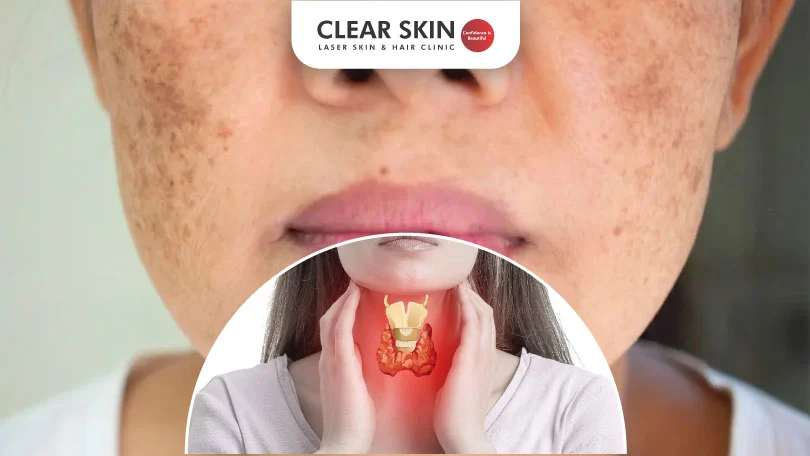Thyroid and Melasma: Causes and Treatment Options
Reviewed By: Dr. Dhanraj Chavan
Updated on: 4th April, 2022

Are you tired of staring at those stubborn brown melasma patches on your face? Did you know your thyroid gland could be one of the cause?
An underactive thyroid gland can disrupt your hormone levels and trigger the formation of melasma patches on your face. But fret not, as our expert dermatologists can help you to manage this condition and reduce the appearance of melasma.
Let’s explore how the thyroid causes melasma and how to manage it.
Table Of Content
- How Does Thyroid Cause Melasma?
- How to Treat Melasma Caused Due to Thyroid?
- Conclusion
How Does Thyroid Cause Melasma?
Melasma is a condition that causes brown or grey patches on the face, typically on the cheeks, forehead, nose, or upper lip. While the exact cause of melasma is unknown, it is believed to be linked to hormonal changes in the body, particularly in women. One of the hormonal imbalances that can trigger melasma is an underactive thyroid gland, also known as hypothyroidism. Let’s understand the connection between the thyroid and melasma.
The thyroid gland, located in the neck, produces hormones that regulate the body’s metabolism and energy levels. When the thyroid gland is not functioning properly, it can lead to other hormonal imbalances, including increased estrogen levels. This increase in estrogen can trigger the development of melasma by stimulating melanin production in the skin.
Additionally, thyroid disorders can also affect the immune system, leading to skin inflammation. This inflammation can exacerbate the appearance of melasma by causing the melanocytes (cells that produce melanin) to produce more pigment.
How to Treat Melasma Caused Due to Thyroid?
Hormonal imbalances due to thyroid and melasma are correlated, and if a thyroid disorder causes melasma, managing the underlying thyroid condition is the best way to treat it. This may involve taking thyroid hormone replacement therapy, adjusting your medication dosage, or making lifestyle changes to improve thyroid function.
In addition to managing your thyroid disorder, there are several melasma treatment options available in Pune for that can help improve the appearance of the skin:
Topical Creams
Several topical creams can help lighten the skin and reduce the appearance of melasma, such as hydroquinone, tretinoin, and azelaic acid. These creams work by inhibiting the production of melanin in the skin.
Chemical Peels
Chemical peels involve the application of a chemical solution to the skin, which causes the dead skin to peel off, revealing smoother, more even-toned skin underneath.
Microdermabrasion
Microdermabrasion is a non-invasive procedure that uses a special device to gently exfoliate the top layer of skin, improving its texture and tone.
Do You Know?
Roughly 250 Patients Are Treated
Everyday By These Dermatologists
(You are one click away from flawless skin)
Meet Our Dermatologist!
Conclusion
While melasma can be a challenging condition to manage, understanding the link between hypothyroidism and melasma and taking steps to manage both can help reduce the risk of developing melasma or improve its appearance.
At Clear Skin Clinics, our team of experts can help you address this issue through personalised melasma treatment in Pune tailored to your needs. Don’t let thyroid-related melasma control your life. Contact Clear Skin Clinics in Pune today to schedule a consultation and learn more about how we can help you achieve clear, glowing skin.
Further Reading
Is Tretinoin Cream Safe for Melasma? Tips and Usage Guide
Discover how tretinoin cream can safely treat melasma.
Unveiling the Potential of Face Packs for Acne Scars
Discover how homemade and customized face packs can help lighten acne marks and rejuvenate your skin.
Home Remedies for Acne Scars
Effective Home Remedies for Acne Scars
Salicylic Acid: Your Ultimate Guide to Banishing Acne Scars
Salicylic acid helps fade acne scars by exfoliating the skin and promoting cell renewal. Discover its benefits, effectiveness, and how to use it safely.
Have thoughts? Please let us know
We are committed not only to treating you, but also educating you.






